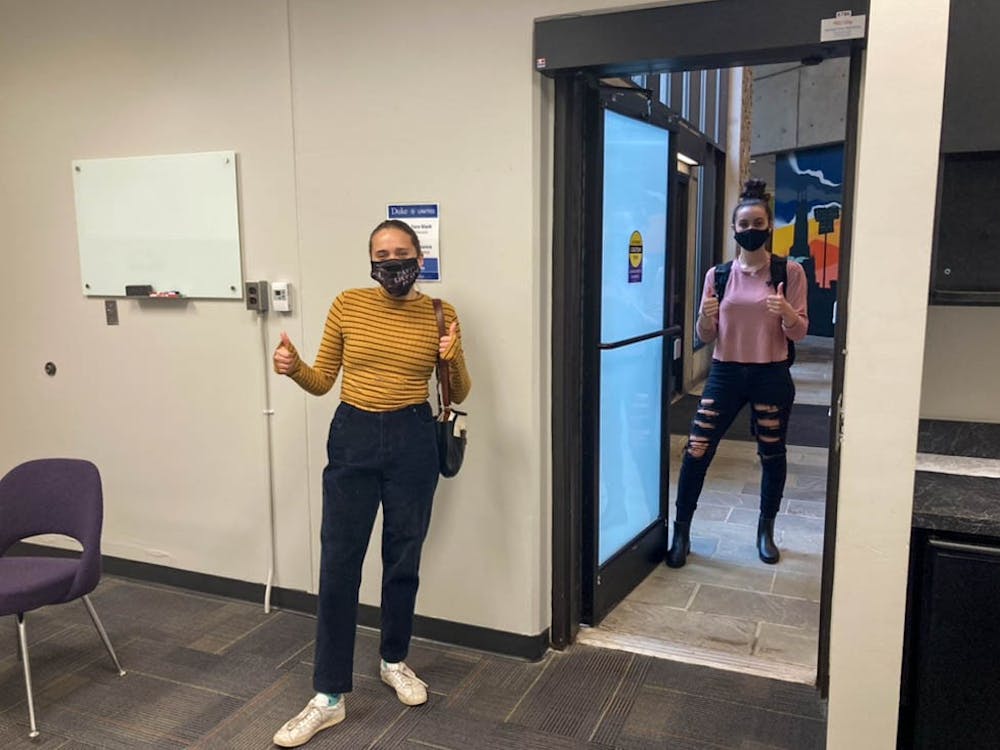Jay Pande had to navigate his undergraduate years at Duke with cerebral palsy, a congenital disorder that affects motor and muscle control.
As a result of Pande’s condition, he experienced countless daily challenges on a campus where many buildings lack automatic doors, elevators and ramps. Like other Duke students with disabilities, Pande faced stigma as well as physical barriers.
Pande, Trinity ‘20, yearned for a space where students with disabilities could connect with one another during his time at Duke. He wrote in an email that he believes students with disabilities have a lot to gain from connecting with each other.
“I think students with disabilities at Duke would benefit greatly if they got to know each other, supported each other through the good and bad and helped each other succeed,” Pande wrote.
Nearly a year after Pande’s graduation, his vision for a community center for students with disabilities is becoming reality. Duke Disability Alliance has secured a physical space in the Bryan Center for students with disabilities to connect with each other and celebrate their identity.
Like the Center for Sexual and Gender Diversity and the Center for Multicultural Affairs, the Disability Cultural Center will provide students from another marginalized identity with recognition, community engagement and support.
The SDAO provides academic and housing accommodations to students with disabilities, but accommodations is often a lengthy process, requiring multiple meetings with SDAO staff and medical documentation from a physician.
Duke students with disabilities are often reluctant to seek or disclose their accommodations through the SDAO, Pande wrote. Pande explained that some students with disabilities contested efforts to move the SDAO from Central Campus to West Campus, scared that their peers would see them coming in and out of the office.
Realizing the extent of the stigma experienced by students with disabilities, Pande aspired to create a place for students with disabilities to feel supported and celebrated on a campus where they feared “being ‘outed’ as disabled.”
In a webinar about demystifying accommodations at Duke, SDAO Director Cort Schneider said Duke has 1,011 students with disabilities.
In March 2019, DDA created a survey for students registered with the SDAO to learn how students could benefit from a disability cultural center center. Out of the 103 respondents, 88.1% thought that the center should be created and 64.4% said they would use it themselves.
Many respondents—41.5% of the 103 surveyed—hoped the new center would foster community among students with disabilities. However, the DDA report recommended that the space lack large windows so “students who may desire privacy” may enjoy the center.
Other universities have successfully opened disability cultural centers on their campuses. These centers serve as advocacy organizations and resource centers for students with disabilities, and some have paid staff that facilitate programming.
Diane Wiener, founding director of Syracuse University’s Disability Cultural Center, said the center has expanded the understanding of disability culture and academic ableism on their campus.
“It’s been really interesting and inspiring to work with [these centers] and see how they really have impacted their community,” said DDA executive board member Maddie Fowler, a senior. She was inspired by others schools’ “ability to create a community around disability where previously disability might not have been welcomed.”
In late 2019, DDA compiled a proposal including research from their SDAO surveys and conversations with other disability cultural centers. They gained administrative support after presenting the proposal to Mary Pat McMahon, vice provost and vice president for student affairs, and Li-Chen Chin, assistant vice president for intercultural programs.
In October 2019, DDA was granted a small temporary space in the lower floor of the Bryan Center, which used to be Chen’s office. The group is now putting final touches on the Disability Cultural Center’s current temporary space, equipping it with accessible sinks and sensory-friendly lighting.
DDA hopes that in future years they will grow into a larger space. Though the center is currently closed due to COVID-19, DDA is hopeful that in-person activities can begin next semester.
The Disability Cultural Center will provide a sensory-friendly, accessible space for meetings, studying and community building and will display works of art highlighting the disabled experience. The center will house a library of work in disability studies, a field Fowler said is not often recognized in academia.
Aside from increasing the visibility of the discipline, Pande wrote that the library will also “help students with disabilities develop a vocabulary and analytical framework to better communicate about and come to terms with their identity.”
Get The Chronicle straight to your inbox
Sign up for our weekly newsletter. Cancel at any time.
The center will illustrate the diversity of disability culture, not as a limitation but as a meaningful contribution to society, Fowler said. DDA is confident that the center will make a positive impact on students, providing them with a collaborative and friendly space to discuss the issues they face at Duke.
“Being part of a vocal and visible community would have been so meaningful and transformative for me when I was at Duke, because I would not have stayed silent about my experiences and I would have proudly embraced my identity as a disabled person,” he wrote. “I think the center will help people who are struggling to have that pride.”
Correction: An earlier version of this story misspelled Li-Chen Chin's name as "Li-Chen Chen." The Chronicle regrets the error.

